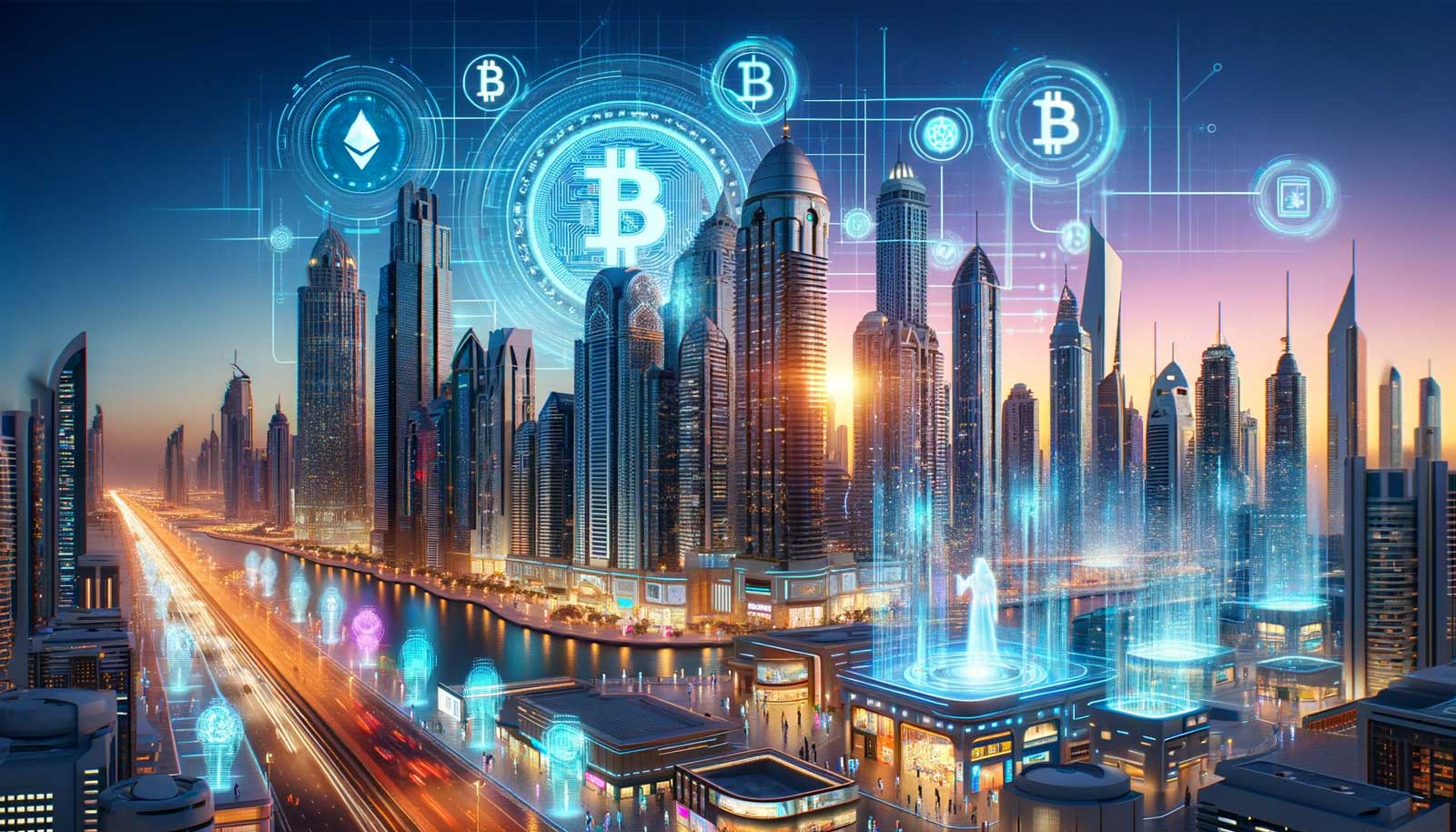Overview of Blockchain Technology
Blockchain technology, originally devised for the digital currency Bitcoin, has evolved into a groundbreaking technological advancement with wide-ranging applications across various industries. At its core, blockchain is a decentralized ledger of all transactions across a network of computers, ensuring that records are secure, transparent, and immutable. This foundational structure of blockchain can potentially revolutionize many aspects of our daily lives and business operations.
Importance of Blockchain in Modern IT
In the realm of Information Technology (IT), blockchain offers numerous advantages over traditional systems, including enhanced security, greater transparency, and the ability to create smart contracts that execute automatically when predefined conditions are met. These features make blockchain a highly attractive technology for industries ranging from finance to healthcare, supply chain management, and beyond.
Dubai’s Vision for Technological Advancement
Dubai, known for its forward-thinking approach to technology and innovation, has set its sights on becoming a global leader in blockchain technology. The Dubai Blockchain Strategy, launched by the Dubai Future Foundation, aims to make Dubai the first city fully powered by blockchain by 2021. This ambitious vision includes integrating blockchain into various government and private sector services to boost efficiency, security, and innovation.
Historical Context
Early Adoption of Blockchain in Dubai
Dubai’s journey with blockchain began in earnest in the mid-2010s when the government started exploring the potential of blockchain technology to streamline public services. The early adoption phase was marked by pilot projects and collaborations with blockchain technology providers.
Key Milestones in Dubai’s Blockchain Journey
Significant milestones in Dubai’s blockchain journey include the establishment of the Dubai Blockchain Strategy in 2016, the successful implementation of blockchain in various government departments by 2018, and the launch of numerous blockchain-based initiatives in the private sector.
Government Initiatives and Support
The Dubai government has been a staunch supporter of blockchain technology, providing a conducive environment for its development and implementation. Initiatives such as the Smart Dubai Office and the Global Blockchain Council have been pivotal in driving blockchain adoption and innovation in the region.
Technical Specifications
Blockchain Basics: Nodes, Chains, and Consensus Mechanisms
Blockchain operates through a network of nodes (computers) that validate and record transactions into a chain of blocks. Each block contains a cryptographic hash of the previous block, a timestamp, and transaction data. Consensus mechanisms like Proof of Work (PoW) and Proof of Stake (PoS) ensure the integrity and security of the blockchain.
Key Blockchain Platforms Used in Dubai
Dubai utilizes several blockchain platforms tailored to meet various needs. Ethereum, known for its smart contract capabilities, and Hyperledger, a permissioned blockchain framework, are among the most prominent. These platforms enable the development of decentralized applications (DApps) and the integration of blockchain solutions into existing systems.
Integration with Existing IT Infrastructure
Integrating blockchain with Dubai’s existing IT infrastructure involves addressing compatibility and interoperability challenges. This includes ensuring seamless data flow between traditional databases and blockchain networks, as well as developing middleware solutions to facilitate communication between different blockchain systems.
Applications in Various Industries
Finance and Banking
Blockchain is transforming Dubai’s finance and banking sector by enabling faster and more secure transactions, reducing fraud, and lowering operational costs. Blockchain-based solutions like cross-border payments and decentralized finance (DeFi) platforms are gaining traction, offering enhanced financial services to consumers and businesses.
Real Estate
In the real estate sector, blockchain simplifies property transactions by providing a transparent and immutable record of ownership and transactions. This reduces the need for intermediaries, cuts down processing time, and increases trust among stakeholders.
Healthcare
Blockchain enhances the healthcare industry by ensuring the secure sharing of patient data, improving the accuracy of medical records, and enabling more efficient healthcare delivery. Blockchain’s immutable nature ensures that patient data cannot be altered, providing a reliable and transparent system for health information management.
Supply Chain Management
Supply chain management benefits from blockchain through improved transparency and traceability of goods. By recording every transaction on a blockchain, stakeholders can track the journey of products from origin to destination, ensuring authenticity and reducing fraud.
Public Services
Blockchain’s application in public services includes secure identity management, transparent voting systems, and efficient land registry processes. These applications enhance the trustworthiness and efficiency of government services, aligning with Dubai’s vision of becoming a smart city.
Tourism and Hospitality
In tourism and hospitality, blockchain streamlines operations such as booking and payment systems ensures data security, and enhances customer experience. Blockchain’s ability to provide a single source of truth helps in managing reservations, loyalty programs, and traveler identities more efficiently.
Education
Blockchain in education facilitates secure and verifiable academic credentials, streamlines administrative processes, and supports innovative learning platforms. This ensures that educational qualifications are tamper-proof and easily verifiable, fostering greater trust in academic achievements.
Benefits of Blockchain in Dubai
Enhanced Security
Blockchain’s decentralized and cryptographic nature provides enhanced security for transactions and data. This is particularly crucial in sectors like finance and healthcare, where data integrity and security are paramount.
Transparency and Trust
By providing an immutable record of transactions, blockchain enhances transparency and builds trust among stakeholders. This is beneficial for industries such as supply chain management and public services, where trust is a key component.
Efficiency and Speed
Blockchain streamlines processes by eliminating intermediaries and automating transactions through smart contracts. This increases the speed and efficiency of operations across various sectors, from finance to real estate.
Cost Reduction
Blockchain reduces operational costs by minimizing the need for intermediaries and reducing fraud. This is particularly advantageous in the financial sector, where transaction fees and processing costs can be significant.
Innovation and Growth
Blockchain fosters innovation by enabling the development of new business models and applications. In Dubai, this has led to the creation of a vibrant ecosystem of blockchain startups and initiatives, driving economic growth and technological advancement.
Challenges and Limitations
Regulatory Hurdles
The regulatory environment for blockchain technology is still evolving, with many uncertainties and challenges. Ensuring compliance with existing laws and developing new regulations that support blockchain innovation without stifling it is a major challenge.
Technical Barriers
Implementing blockchain technology involves overcoming significant technical barriers, such as scalability issues and the complexity of integrating blockchain with existing systems. These challenges require ongoing research and development.
Adoption and Integration Issues
Widespread adoption of blockchain technology requires a cultural shift and significant investment in education and training. Integrating blockchain into existing business processes also poses challenges, particularly for legacy systems.
Scalability Concerns
Blockchain networks can face scalability issues, particularly as transaction volumes increase. Solutions such as sharding and off-chain transactions are being developed to address these concerns, but they are not yet fully mature.
Privacy and Data Protection
While blockchain provides enhanced security, it also raises privacy and data protection concerns. Ensuring that sensitive data is protected while maintaining the transparency and immutability of the blockchain is a delicate balance.
Latest Innovations
Smart Contracts
Smart contracts are self-executing contracts with the terms directly written into code. They automatically execute and enforce agreements, reducing the need for intermediaries and increasing efficiency and trust.
Decentralized Finance (DeFi)
DeFi platforms use blockchain technology to offer financial services without traditional intermediaries. This includes lending, borrowing, and trading, providing greater accessibility and efficiency in financial services.
Non-Fungible Tokens (NFTs)
NFTs represent unique digital assets and have gained popularity in art, entertainment, and gaming. They provide a new way to buy, sell, and trade digital assets, creating new opportunities for creators and collectors.
Blockchain-as-a-Service (BaaS)
BaaS platforms offer blockchain infrastructure and services on a subscription basis, making it easier for businesses to adopt and implement blockchain technology without the need for significant upfront investment.
Interoperability Solutions
Interoperability solutions enable different blockchain networks to communicate and share data, enhancing the functionality and utility of blockchain technology. This is crucial for the development of a cohesive blockchain ecosystem.
Future Prospects
Long-term Vision and Goals
Dubai’s long-term vision for blockchain includes becoming a global leader in blockchain innovation and fully integrating blockchain into its economy and public services. This involves ongoing investment in research, development, and education.
Potential Impact on Dubai’s Economy
The widespread adoption of blockchain technology is expected to have a significant positive impact on Dubai’s economy. It will drive innovation, create new business opportunities, and enhance the efficiency and transparency of various sectors.
Expected Technological Developments
Future technological developments in blockchain are likely to focus on improving scalability, interoperability, and security. Advances in quantum computing and artificial intelligence may also play a role in enhancing blockchain technology.
Comparative Analysis
Comparison with Traditional IT Solutions
Compared to traditional IT solutions, blockchain offers greater security, transparency, and efficiency. While traditional systems rely on centralized databases, blockchain’s decentralized nature provides inherent advantages in terms of data integrity and trust.
Comparison with Other Emerging Technologies
Blockchain complements other emerging technologies such as artificial intelligence, the Internet of Things (IoT), and big data analytics. Together, these technologies can create powerful synergies, enhancing their individual and collective impact.
User Guides and Tutorials
Setting Up a Blockchain Node
Setting up a blockchain node involves installing the necessary software, configuring the node, and connecting it to the blockchain network. Detailed guides and tutorials are available from blockchain platform providers.
Developing Smart Contracts
Developing smart contracts requires knowledge of programming languages like Solidity (for Ethereum) and an understanding of the specific requirements of the contract. Numerous online courses and resources are available to help developers get started.
Implementing Blockchain in Business Processes
Implementing blockchain in business processes involves identifying suitable use cases, designing the blockchain architecture, and integrating it with existing systems. Consulting with blockchain experts and utilizing BaaS platforms can facilitate this process.
Conclusion
Recap of Key Points
Blockchain technology is revolutionizing Dubai’s IT region by enhancing security, transparency, and efficiency across various sectors. Government support and innovative initiatives have positioned Dubai as a global leader in blockchain adoption and development.
Future Implications and Opportunities
The future of blockchain in Dubai looks promising, with the potential for significant economic impact and technological advancements. Ongoing research and development, coupled with supportive regulatory frameworks, will drive further innovation and adoption.
Call to Action for Stakeholders
Stakeholders in Dubai’s IT and business sectors are encouraged to explore blockchain technology and consider its potential benefits. By embracing blockchain, they can contribute to Dubai’s vision of becoming a fully blockchain-powered city and leverage the numerous opportunities this technology offers.


